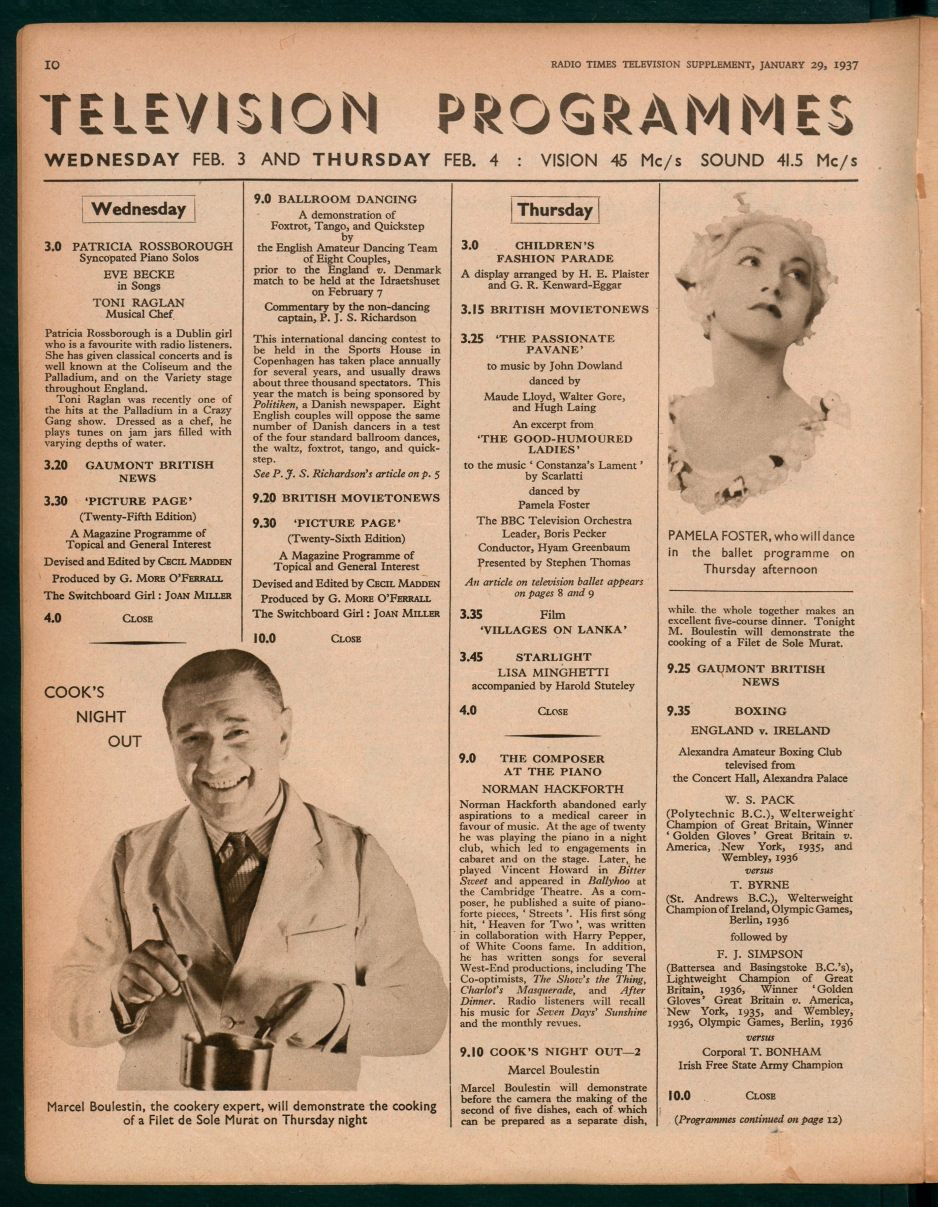England vs Ireland (lost television coverage of boxing matches; 1937)
On 4th February 1937, two amateur boxing matches pitting English competitors against Irish counterparts occurred at the Concert Hall at Alexandra Palace. Featuring a welterweight bout between W.S. Pack and T. Byrne, and lightweights F.J. Simpson against Corporal T. Bonham, the matches were televised live by the BBC. The BBC also claims the matches were the first television sporting event to receive live commentary.
Background
Heading into the matches, all four boxers had captured championships during their careers.[1][2] W. S. Pack captured the British Welterweight Championship, having also won the "Golden Gloves" during Great Britain's 1935 tour of America in New York, and a reverse 1936 tour at Wembley.[1][2] His opponent, T. Byrne, was Ireland's Welterweight Champion, having also participated in the 1936 Summer Olympics.[1][2] F. J. Simpson was the British Lightweight Champion, having won at the "Golden Gloves" event by beating Murray Kravitz, and participated in the Berlin Games, later turning professional.[3][1][2] Finally, Corporal T. Bonham was the Irish Free State Army Champion.[1][2] Because the matches pitted English against Irish boxers, they were billed as England facing Ireland in Issue 696 of Radio Times.[4][1][2]
Four years prior to the bouts, the BBC had televised two boxing matches at the Broadcasting House on 22nd August 1933.[5] Following the opening of its high-definition Television Service on 2nd November 1936, the BBC were against interested in televising sports.[6][7][4] Having based its Television Service at Alexandra Palace, the BBC decided to televise the Alexandra Amateur Boxing Club matches, who shared the Palace and typically conducted matches at the Palace's Concert Hall.[8][4][1][2] This prevented the need for an outside broadcast, which often proved impractical until the BBC provided coverage of the Coronation of King George VI and Queen Elizabeth on 12th May that same year.[9][4][6] The broadcast was intended to last around 25 minutes, with arena lighting being a primary concern for adequate television quality.[4][1][2][8] Up to 20,000 households were able to view the coverage.[10]
Alas, the match outcomes were not recorded.[4] Nevertheless, it is known that commentary for the bouts was provided by Harry Mallin, an amateur boxer who held the British Middleweight Championship from 1919 to 1923, and had earned gold medals in the middleweight divisions for both the 1920 and 1924 Summer Olympics.[11][4] The BBC's claims the broadcast was the "first television sports event to feature a live commentary".[4][6] It is unclear what the corporation means by this, as commentary was provided by Viscount Scarsdale and Jim Mollison for its 1933 broadcasts.[5] It could be referring to its first television sports commentary since it opened its new Television Service, or alternatively, was the first television-exclusive sports commentary.[4][7][6] Often, the BBC's early sports output would simply rely on the more popular radio commentary rather than producing a television version, as was the case with its 1938 Boat Race broadcast.[12] The BBC would continue with its boxing coverage, including providing coverage of the British Light Heavyweight Championship match between Jock McAvoy and Len Harvey on 4th April 1938, which was the first known televised nonexhibition professional match.[5][8]
Availability
Ultimately, the boxing matches were televised live during an era where telerecordings seldom happened until videotape was perfected in the late-1950s.[13] No footage nor images of the bouts are known to have survived, though Issue 696 of Radio Times helps to document the broadcast's existence.[1][2][4]
See Also
- Bill Lewis vs Freddie Baxter and Archie Sexton vs Laurie Raiteri (lost television coverage of boxing matches; 1933)
- Corbett and Courtney Before the Kinetograph (partially found early boxing film; 1894)
- Exhibition Boxing Bouts (lost early television coverage of boxing matches; 1931-1932)
- Georges Carpentier vs Ted "Kid" Lewis (lost radio coverage of boxing match; 1922)
- Heavyweight Champ (lost SEGA arcade boxing game; 1976)
- Jack Dempsey vs Billy Miske (lost radio report of boxing match; 1920)
- Johnny Ray vs Johnny Dundee (lost radio coverage of boxing match; 1921)
- Leonard-Cushing Fight (partially found early boxing film; 1894)
- Rocky (lost deleted scenes of boxing drama film; 1976)
- Uncle Slam and Uncle Slam Vice Squad (lost iOS presidential boxing games; 2011)
References
- ↑ 1.0 1.1 1.2 1.3 1.4 1.5 1.6 1.7 1.8 BBC Genome archive of Radio Times issues detailing the broadcast and summarising the four boxers. Retrieved 25th Dec '22
- ↑ 2.0 2.1 2.2 2.3 2.4 2.5 2.6 2.7 2.8 Issue 696 of Radio Times listing the broadcast. Retrieved 25th Dec '22
- ↑ Olympedia page on Freddie Simpson. Retrieved 25th Dec '22
- ↑ 4.0 4.1 4.2 4.3 4.4 4.5 4.6 4.7 4.8 4.9 BBC summarising its broadcast and claiming it became the "first television sports event to feature a live commentary". Retrieved 25th Dec '22
- ↑ 5.0 5.1 5.2 The Golden Age of Boxing on Radio and Television detailing the BBC's broadcasts of boxing matches in 1933 and 1938. Retrieved 25th Dec '22
- ↑ 6.0 6.1 6.2 6.3 This is the BBC summarising its early programming for its Television Service, including the live commentary for the two boxing matches. Retrieved 25th Dec '22
- ↑ 7.0 7.1 BBC detailing the opening of its BBC Television Service. Retrieved 25th Dec '22
- ↑ 8.0 8.1 8.2 BBC Sport in Black and White detailing the coverage of the matches, including the BBC's agreement with the Alexandra Amateur Boxing Club and issues with lighting. Retrieved 25th Dec '22
- ↑ BBC detailing its broadcast of the Coronation of King George VI and Queen Elizabeth. Retrieved 25th Dec '22
- ↑ Sports Business Management noting the broadcast could have reached up to 20,000 households. Retrieved 25th Dec '22
- ↑ English Heritage detailing the career of Mallin. Retrieved 25th Dec '22
- ↑ BBC detailing its broadcast of the 1938 Boat Race, utilising the same commentary for television and radio. Retrieved 25th Dec '22
- ↑ Web Archive article discussing how most early television is missing due to the lack of directly recording television. Retrieved 25th Dec '22
